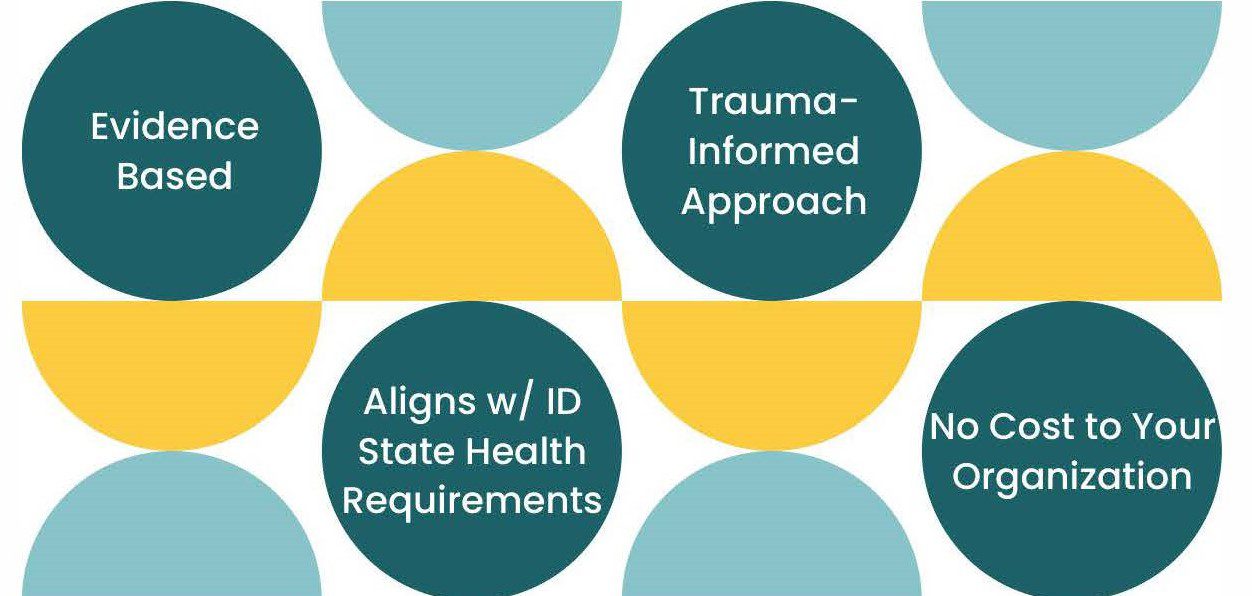Healthy Relationships Education
Home »
The Healthy Relationships Education program utilizes a research-based curriculum designed to help teens develop the foundational skills they need to establish thriving relational habits.
Offering presentations for individuals from middle school through adulthood, the REAL Essentials Curriculum is a compelling set of tools to help pave the way towards optimal health and success.

Relationships are foundational to each of our lives.
Developing strong relationships is essential in various aspects of life, such as friendships, work, parenting, and being parented. Our ability to connect meaningfully and interact healthily has a significant impact on both individuals and communities. The desire to connect, feel affirmed, and be valued, respected, and loved is fundamental to the human experience.
The Healthy Relationships Education program focuses on relational health, using the REAL Essentials Advanced curriculum designed to help teens learn foundational skills for healthy relationships. Strong relationship skills enable effective communication, constructive conflict resolution, and the establishment of lasting trust. The curriculum comprises engaging, powerful, research-based, and evidence-informed lessons aimed at setting teens on a path toward optimal health.
The lessons are science-based, activity-oriented, and presented with a trauma-informed approach. They focus on questions such as: Who am I? What are cultural roles versus what is rooted in biology? What does intimacy look like? What is my personal voice, and how and when do I use it in a relationship?
Our presenters are certified Sexual Risk Avoidance Specialists (SRAS) through the Ascend program and operate under the guidance of a Community Health Nurse. Presentations can be tailored to the demographic or need of a group. They can be provided on-site (school, church, or community space) or in one of the Open Arms Real Choices Clinic community rooms in Hayden, Idaho. The Healthy Relationships Education program is provided free of charge to our community.
What does the research say?
Research indicates that social connection improves physical health, mental health, and emotional well-being. Healthy relationships are essential for success in life, and therefore relationship education is a vital component for equipping teens to thrive.
Learning Theories and models utilized in the development of presentations include, but are not limited to:
Adverse Childhood Experiences (ACEs)
Developmental Assets Framework
CDC’s Youth Risk Behavior Survey
Optimal Health Model
Primary Prevention Health Model
Social Cognitive Theory
Social Inoculation Theory
Social Norms Theory
Success Sequence Model
Theory of Planned Behavior
The Transtheoretical Model (Stages of Change)
Trauma-Informed Approach
What topics can be covered?
The REAL Essentials curriculum covers a wide variety of topics, including:
- Bullying & Violence
- Committed love & Marriage
- Dating Decisions
- Drug & Alcohol Abuse
- Effective Communication
- Interpersonal & Social Skills
- Leadership & Job Readiness
- Navigating conflict
- Self-Identity
- Setting Boundaries
- Sexual Health
- Social Media Literacy
- Suicide Prevention
- Understanding Others’ Perspectives
Can you tell me more about the curriculum?
REAL Essentials Advanced Curriculum is an evidence-based and evidence-informed curriculum developed by The Center for Relationship Education founder Joneen Mackenzie RN. For more information about the curriculum and the resources they provide, please visit their website.
What Defines a Healthy Relationship?
Characteristics of Healthy Relationships include:
- Mutual trust
- Honesty
- Compromise
- Emotional safety
- Shared values
- Shared goals
- Asking for what you need
- Connectedness to family and friends
- Individuality
- Skilled communication
- Humor and fun
- Ability to control anger
- Ability to resolve conflict
- Ability to problem solve
- Mutual respect autonomy and dependence
Characteristics of Unhealthy Relationships include:
- Control
- Hostility
- Contempt
- Defensiveness
- Dishonesty
- Disrespect
- Passive-aggressive behaviors
- Sarcasm
- Dependence
- Intimidation
- Threats
- Isolation from family and friends
- Physical violence
- Emotional manipulation
- Sexual violence
- Power plays
Testimonials
“It (the class) really helped me think about sex not being at the beginning of a relationship but the end of a committed healthy one instead.”
“This was really great and stuff I hadn’t heard before.
Worth the time to come.”

